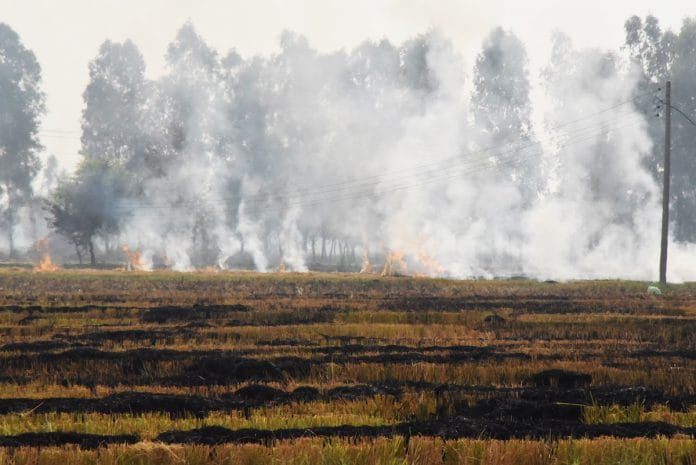Stubble burning is a major cause of air pollution and is blamed for the blanket of smog that covers Delhi in October and early November each year.
Chandigarh: The Punjab Farmers Commission has announced a million-dollar award for the most viable eco-friendly technological solution to paddy straw burning, a perennial problem in the state that is blamed for the smog that blankets Delhi in winter.
The “challenge fund”, announced by the government-run commission last week, is open to individuals, organisations, research institutions and companies across the world. The $1 million will be awarded to the entry that demonstrates an environment-friendly, economical and time-bound solution to the problem.
Paddy harvesting is set to begin in Punjab and neighbouring Haryana and incidents of straw burning are already being reported from pockets in Karnal. Burning of crop residue by farmers who have to prepare their harvested fields for the wheat is rampant in the two states.
Almost 3 million hectares in Punjab are under paddy cultivation and almost 20 million tonnes of paddy straw is produced each year.
The stubble burning, on large hectares of fields across northern India, is mainly blamed for the blanket of smog that covers Delhi and its surrounding areas in October and early November each year.
Also read: To stop stubble burning, Punjab makes it mandatory to affix machine to combine harvesters
The essence of the problem, as also its solution, lies in time, says Balwinder Singh Sidhu, member secretary of the commission.
“After harvesting paddy, farmers resort to burning its straw because the window for sowing the following crop is short — around 20 days — and also burning is the least expensive proposition,” he says.
The commission is, therefore, looking for a solution that will take care of the problem in the three-week gap between the harvesting of paddy and sowing of wheat.
“What we need is a method of microbial decomposition that manages the straw in-situ (at the place where it is). All mechanical efforts of removing the paddy straw from the field are expensive and time-consuming,” he said.
Terms and conditions
The challenge does come with conditions. For one, the entry fee for eligibility has been set at $2,000. “The entry fee is to ensure that only those seriously interested in working on a solution apply to us,” says Sidhu.
The fee will be collected by the Punjab Agricultural University, Ludhiana, and the entries will be evaluated by an expert committee constituted by Punjab State Farmers’ and Farm Workers’ Commission. The challenge is valid for two years.
The other conditions are that the technology should also ensure in-situ decomposition/degradation of surface-retained paddy straw within 20 days of harvesting by combine harvester under ambient Punjab conditions so as to enable unhindered sowing of the following crop.
The tech solution should have no negative impact on soil, crop productivity and human health; it should be applicable to the currently recommended varieties of paddy in the state with a minimum straw load of 6-7 tonnes/hectare and it should have a favourable cost to benefit ratio.
Sidhu said a special provision in the Punjab budget has been made for the award money.
“An amount of Rs 5 crore is already sanctioned. Since the rupee has devalued, an additional amount will be required, which will be made available.”
Govt disburses subsidised equipment
The government has so far delivered around 7,300 subsidised farm machines for management of paddy residue.
Agriculture secretary K.S. Pannu, who is also the state nodal officer for management of crop residue, said a subsidy of 50 per cent is being provided to individual farmers and 80 per cent to cooperative societies. “In all, 24,315 machines will be supplied to farmers and cooperative societies this season,” he said.
The distributed equipment includes the latest happy seeder, paddy straw chopper, mulcher, shrub cutter, zero till drill, super straw management system on combine harvesters, rotary slasher and rotavator.
Also read: MGNREGA won’t put out crop stubble burning, says govt panel
“The entire funding for this scheme to manage crop residue is being done by the government of India. They have sanctioned Rs 650 crore for Punjab, of which Rs 250 crore has been spent on subsidies for machines and equipment and another Rs 20 crore on generating awareness,” Pannu said.






